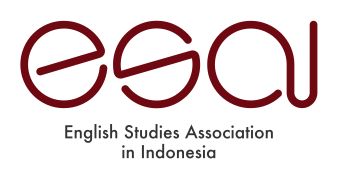Indonesian EFL Students' Production of English Lexical Collocation in Writing
Abstract
Knowing a word is not only knowing its form and meaning. Hanks (1987) affirmed that words do not co-occur freely and randomly. Uncommon production of collocation may pose confusion to the listeners. Although a word can possibly be synonymous with one another; improper combinations of words can cause incongruity. The respondents of the study are students of the English Language and Culture Department (BBI) from semester 6 at Bunda Mulia University, as they all have accomplished their reading subjects and are expected to have a wide vocabulary at this level. This research is conducted to spot collocational errors, as well as to relate the errors to the influence of the L1 (mother tongue) in the production of the collocations in the students’ writings. From 20 students’ essays of which topic was “How do movies or televisions influence people’s behavior”, it is found that there are twenty two errors that were possibly resulted from six different causes.
Keywords: Collocational errors, mother tongue
Full Text:
PDFReferences
Benson, M., Benson, E., & Ilson, R. (1997). The BBI dictionary of English word combinations. BBI Combinatory Dictionary of English. Amsterdam: Benjamin.
Farghal, M., & Obiedat, H. (1995). Collocations: A neglected variable in EFL. IRAL, 4, 315-331.
Hank, P. (1987). Definition and explanation. In J. Sinclair, Looking Up (pp. 116-136). Glasgow: Collins ELT.
Hill, J., Lewis, M., & Lewis, M. (2000). Classroom strategies, activities and exercises. In M. Lewis, Teaching collocation: Further developments in the lexical approach (pp. 88-116). Boston, MA: Thomas Heinle.
Nugroho, A. (2014). Teachers’ knowledge and production of English lexical collocations. Jakarta: Bunda Mulia University.
Sinclair, J., Jones, S., & Daley, R. (2003). English collocation studies: The OSTI report. University of Birmingham Press.
Veronica. (2009). Indonesian EFL teachers’ knowledge and production of English lexical collocations: A case study. Jakarta: Atma Jaya Catholic University.
Wray, A. (2002). Formulaic language and the lexicon. New York, NY: Oxford University Press.
DOI: http://dx.doi.org/10.30813/jelc.v7i2.1025
Refbacks
- There are currently no refbacks.



2.jpg)



